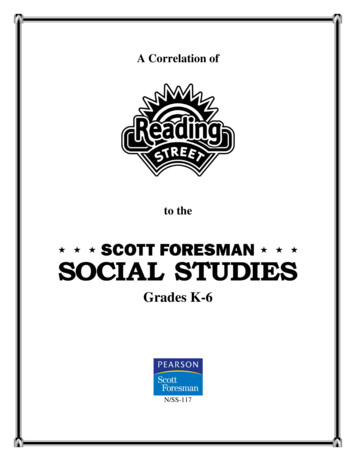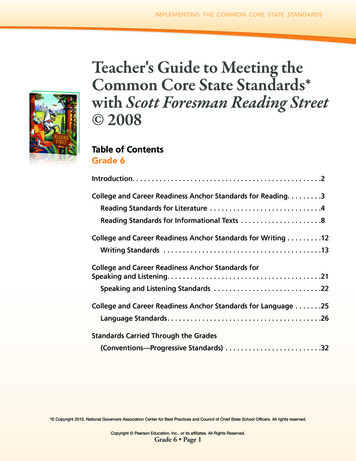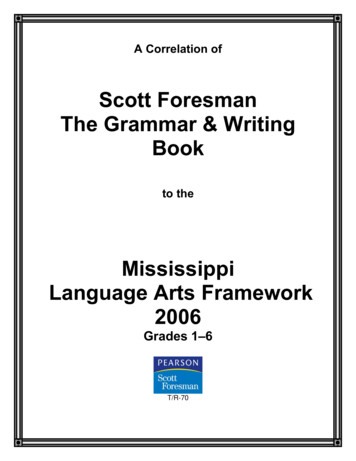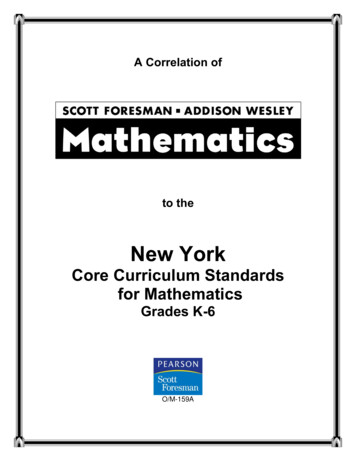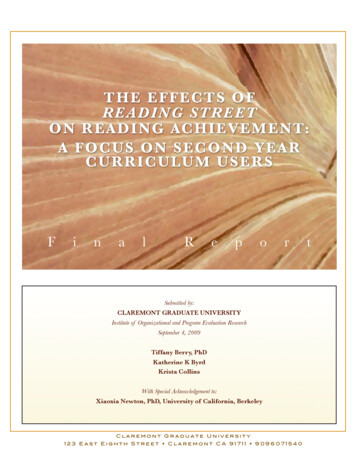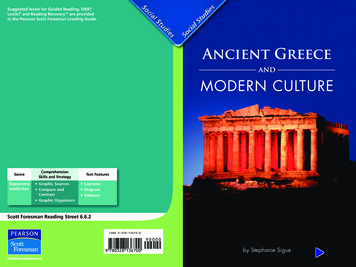
Transcription
Suggested levels for Guided Reading, DRA, Lexile, and Reading Recovery are providedin the Pearson Scott Foresman Leveling Guide.Ancient GreeceandMODERN s and Strategy Graphic Sources Compare andContrast Graphic OrganizersText Features Captions Diagram SidebarsScott Foresman Reading Street 6.6.2ISBN 0-328-13670-0ì (sk m) bdgha -Ä-U-Ä-Uby Stephanie Sigue
ReaderResponseAncient Greeceand1. Look at the drawing of the Ionic column on page 15. Whydo you think there is a gap on the drawing between thetop and bottom of the column?MODERN CULTURE2. Make a web like the one below to show ways in which theGreeks contributed to intellectual, cultural, and scientificareas of modern life. Add as many ovals as you fic3. Using an advanced or unabridged dictionary, how manywords can you find that are related to ideal? Use two ofthem in sentences.4. Look at the pictures of ancient and modern heroes onpage 9. How do you think modern heroes differ fromancient heroes? How do you think they are similar?by Stephanie SigueEditorial Offices: Glenview, Illinois Parsippany, New Jersey New York, New YorkSales Offices: Needham, Massachusetts Duluth, Georgia Glenview, IllinoisCoppell, Texas Ontario, California Mesa, Arizona
PhilosophyStudying Ancient Greece helps us answer questionsthat come up every day. Ancient Greece is often calledthe “birthplace of western civilization” because itspeople influenced the way we look at the world.They were curious. They questioned everything.They wanted to know the answers to questions thatpeople have asked throughout time. They “invented”philosophy, the study of the meaning of life.Socrates, the most famous Greek philosopher,questioned everything. He answered every question withanother question. This forced his students to examinetheir own ideas and arrive at the truth for themselves.Every effort has been made to secure permission and provide appropriate credit forphotographic material. The publisher deeply regrets any omission and pledges tocorrect errors called to its attention in subsequent editions.Unless otherwise acknowledged, all photographs are the property of Scott Foresman,a division of Pearson Education.Photo locators denoted as follows: Top (T), Center (C), Bottom (B), Left (L), Right (R),Background (Bkgd)Opener Charles O’Rear/Corbis; 1 Reuters/Corbis; 3 Ted Spiegel/Corbis; 4 ChristineOsborne/Corbis; 5 Royalty-Free/Corbis; 6 (Inset) Bettmann/Corbis, 6 (B) SteveChenn/Corbis; 7 James P. Blair/National Geographic/Getty Images; 8 ArchivoIconografico, S.A./Corbis; 9 (CL) Bettmann/Corbis, 9 (BR) Raymond Gehman/Corbis;10 Bettmann/Corbis; 11 Hulton Archive/Getty Images; 12 Araldo de Luca/Corbis;13 Massimo Listri/Corbis; 14 Charles O’Rear/Corbis; 15 (BL) Bettmann/Corbis,15 (BR) Dave Bartruff/Corbis; 17 Wolfgang Kaehler/Corbis; 19 Tom Stewart/Corbis;20 Michael Nicholson/Corbis; 21 Wally McNamee/Corbis; 22 Reuters/Corbis;23 Royalty-Free/CorbisISBN: 0-328-13670-0Copyright Pearson Education, Inc.All Rights Reserved. Printed in the United States of America. This publication isprotected by Copyright, and permission should be obtained from the publisherprior to any prohibited reproduction, storage in a retrieval system, or transmissionin any form by any means, electronic, mechanical, photocopying, recording, orlikewise. For information regarding permission(s), write to: Permissions Department,Scott Foresman, 1900 East Lake Avenue, Glenview, Illinois 60025.2 3 4 5 6 7 8 9 10 V0G1 14 13 12 11 10 09 08 07 06 05The wordacademy is asynonym forschool. It comesfrom Plato’sAcademy inAncient Greece,named for apark outside ofAthens.Plato, a student of Socrates, built on Socrates’teachings. Plato started a school called the Academy.Here, his students studied every subject of the time.Plato’s prize student was Aristotle, whose goal was tounderstand everything. Aristotle’s ideas influenced allareas of Western thought including science, politics,and religion.3
GovernmentThe Greeks thought of many ways to answer theirquestions about governing. About 510 B.C. the Greek citystate of Athens instituted a new way of governing calleddemokratia. Today we call it democracy. Democracymeans “rule by the people.”Before it became a democracy, Athens was amonarchy, ruled by kings. Later, it became an oligarchy,meaning “ruled by a few.” In an oligarchy, the people ofpower and wealth rule. The Greek city-state Sparta wasan oligarchy for much of its history.Although the Athenians gave us democraticgovernment, democracies today are different from theancient model. In ancient Athens, only men who hadserved in the military could vote. This meant that everyfree male over 18 years of age and of Athenian parentagewas eligible. Rather than choose from a list of names on aballot as we do, the Athenians chose government officialsfrom the list of citizens by lottery. Then they set termlimits, the number of years someone could stay in office.Three groups of people couldn’t vote at all in theelections, even though they made up a majority of thepopulation. They were women, slaves, and non-Athenianresidents. Slaves had no legal or political power andcould not have families of their own or own property.Each voting citizen could come to the Assembly andsay what he had to say. Today, since most democraticgovernments are too large to allow every citizen adirect voice in the legislative process, the public electsrepresentatives to speak for the group.Greek citizens met in an open forum (above) to discuss public policy.Today, we elect representatives who meet in the United StatesCongress (opposite).45
The Greeks also gave us the idea of trial by jury. Inancient Athens, a jury consisted of 400 to 500 people.During a trial, the jury listened as the plaintiff made aspeech. Then the defendant had his turn. After all thewitnesses had been heard, the jury voted on whetherthe defendant was guilty or innocent. The side that gotthe most votes won. After the jury heard speeches onwhat the punishment should be, they voted again. Thepunishment that got the most votes would be the onethat was carried out.Today some form of trial by jury exists in mostdemocracies. The accused is allowed to have a lawyerand to have his or her “day in court.” A judge or a jury—often consisting of twelve people—hears the case anddetermines guilt or innocence. The jury or a judge thendetermines punishment.Athenian democracy actually lasted less than 200years, and it was another 2,000 years or so until—quiteindependently—it was “invented” all over again. Yetit is amazing that democraciesthroughout the world hold toprinciples so similar to those thatwere set down so long ago.Myths and MythologyTo answer their questions about how the world works,the Greeks developed myths. They told stories about thegods that influence human lives and about each god’spowers or achievements. There was a god of war, a godof the sea, a god of light, a god of music, and so on.From among all the gods, the Greek poet Homer namedtwelve as the most important. He said they lived in animportant place—on top of Mount Olympus.A person could find the answer to any question aboutnature and life in Greek mythology. The Greeks offeredup prayers and gifts to the gods, hoping to gain goodluck, good health, success in business, or victory on thebattlefield. They believed the gods determined whathappened. As the Greeks were very religious, they heldreligious ceremonies everywhere—at home, at work, atgovernment functions, and at sporting events.(Top) Socrates, the philosopher, was found guilty of treason by a jury ofhis peers in ancient Greece. (Bottom) A modern jury listens to a case.67
The most important gods in Greek mythology werethe Olympian gods. Most of these gods were handsomeand beautiful with perfect bodies. They had plenty ofhuman faults, however, as the poet Homer detailed in hisepic poems. They could be jealous and mean, and theycould play horrible tricks on each other or on others.As they were gods, however, they had one quality thatpeople didn’t have—they were immortal.Greek mythology wasn’t just about religion andstory telling. The myths were a way in which poetsand minstrels could preserve history. And if storytellerssometimes embellished or even made up heroic acts toadd to the well-known myths, this just helped the heroesclaim mythical ancestors and add to their reputations.Through the myths, the Greeks also promoted a moralcode. In the stories, heroes could have faults—and oftendid—but they were always loyal to their families andfriends and faithful to their gods. Those who were notoften came to dreadful ends. Although few achievedthis goal of perfect behavior, still, perfection was a goalthat everyone could strive for. Centuries later, writers stillsometimes include morals in their storytelling. They usemyth making to create heroic characters in literature andin film.(Top) Sculpture of Hercules, ahero from Greek mythologyThe pantheon, or entire collection, of Greek gods grew toinclude hundreds of gods.8(Bottom) Firefighter FaithQualtieri at Point ReyesNational Seashore, 1995.9
ScienceThe Greeks contributed heavily to the fields of science,mathematics, literature, art, and architecture. Theiradvances in these fields showed the wide scope of theircuriosity and skills.The Greeks were considered the founders of modernscience. They had a special interest in nature and werethe first to use scientific principles. They studied andobserved objects in nature to form general principles.They took what they knew and applied logic and reasonto come to a conclusion about their questions. This ledto important discoveries in fields such as astronomy andmedicine.Anaxagoras, one of the earliest astronomers, was thefirst to say that the sun was a white-hot rock. Before that,people thought the sun was a god. He also explainedhow eclipses take place. Other Greek astronomersexplained how the Earth rotates on its axis and therotation of the planets.Hipparchus, who made astronomical observations on the island ofRhodes and in Alexandria, Egypt, calculated the length of the year.10The Greek scientist Hippocrates is considered thefather of medicine. Hippocrates and scientists whofollowed him determined that illness is the result ofphysical problems, not of evil spirits. He said peoplecould control sickness through proper diet, exercise, andmedicine.Today, doctors still take an oath called the Hippocraticoath before they begin to practice medicine. In it, theypromise to help the sick through scientific study andtreatment. They also promise to use their knowledge forthe good of their patients.Hippocrates is considered the father of medicine.Medical students today take a Hippocratic oath.11
MathematicsThe Greeks also made important contributions in thefield of mathematics. In fact, the studies of Pythagoras,a Greek philosopher and mathematician, became thefoundation for modern mathematics. Pythagoras isresponsible for much of what we know about odd andeven numbers. His school also developed what is nowcalled the Pythagorean theorem in geometry, stating thatthe square of the hypotenuse of a right triangle is equalto the sum of the squares of the other two sides.Euclid, another Greek mathematician, wroteElements, a study of plane geometry, proportions,and the theory of numbers. Today, Euclid’s Elements isstill used as a basis of high school instruction in planegeometry.Archimedes, another Greek mathematician, wroteabout his investigations in geometry, arithmetic, andmechanics. He made important discoveries regardingcurved and solid figures. In mechanics, he explained theprinciple of the lever and invented the pulley.a2 b2 c2caArtThe foundation of Western art also comes from theGreeks. The Greeks believed that “man is the measure ofall things” and regarded the human body as an art form.Sculptors made statues of people and gods in relaxedand lifelike poses. Before, bodies had been portrayed instiff and stylized ways. Now they showed movement andemotion. Sculptors also began to show human triumphsand suffering in their art work, instead of focusing onlyon the gods.Painters alsobegan creatingrealistic picturesof everyday life.Scenes painted onpottery showedpeople in their dailylives—working,cooking, playing, andobserving religiouspractices. At thesame time, objectsused in daily lifebecame works ofart. Bowls, pitchers,cups, and vessels forholding water, oil, orfood were paintedand decorated byartists.bGreek scholars made many important contributions to ourunderstanding of mathematics. They also invented many simpletechnical devices.1213
ArchitectureIn architecture, the Greeks developed a rangeof building types used for many different purposes:religious, civic, domestic, funerary, and recreational.They built temples, government and public buildings,private homes, funeral tombs and mausoleums, stadiums,theaters, concert halls, and gymnasiums. These basickinds of architectural purposes continue to influencemodern architecture today.Early Greek buildings sat on platforms. The roofswere supported by columns. The Greeks developed threemajor architectural styles that are easily recognizable: theDoric, the Ionic, and the Corinthian. One basic differenceamong them shows in the bases of the columns and thefriezes, or ornamented bands, above the columns. Ingeneral, the Doric style is simple, while the Ionic is moredecorative, and the Corinthian is quite elaborate.Although buildings became larger and more ornateas Greek culture developed, the shape of structuresremained the same. Many buildings had courtyards atthe center and rooms around them, while some hadbalconies, where people could stand and watch activitiesin the open areas below.Private homes also often had rooms arranged aroundan interior courtyard. The rich had homes with lavishfeatures—marble entryways and columns. The floorswere covered with intricate mosaics, and plaster on thewalls was often painted to look like stonework.The Doric column(below) was simple instyle, while the Ioniccolumn (left) wasmore decorative.The Parthenon in Athens, Greece1415
Literature and DramaHomer was the great poet of the Greeks. His epicpoems, the Iliad and the Odyssey, tell the story of theTrojan War and its aftermath. Homer’s stories of godsand heroes were told aloud for generations. The Greeksloved his vivid action scenes and emotional descriptionsof victory and defeat.As Greek civilization developed, two main formsof theater emerged: tragedy and comedy. Aeschylus,Sophocles, and Euripides were the most famous authorsof tragedies—plays with sad endings.Greek tragedies were often based on myths or historyand often raised difficult moral issues. Thousands ofpeople packed into outdoor amphitheaters during theannual theater festivals. The performances lasted forhours and generated much praise and criticism.In the comedies, Greek playwrights such asAristophanes exercised their sense of the ridiculous. Likemany comedy writers today, they satirized or made fun ofleaders and other people in power.Many of today’s playwrights and screenwriters lookto Greek drama for ideas. In fact, Greek plays are stillperformed today. The questions they raise about moralityand justice still have significance for modern audiences.1617
Physical FitnessIn Ancient Greece, physical beauty, health, andstrength were highly valued. Physical fitness wasso important to the Greeks that they built publicgymnasiums for training and stadiums for competitions.Every city-state had a gymnasium. It contained a placeto exercise, a running track, a bathing room, a lecturehall, and a park. Here, men and boys worked hard tokeep their bodies in ideal condition. In the city-state ofSparta, girls also received physical training.Most men and boys went to the gymnasium daily.Boys played ball games, ran, and learned to toss thejavelin and throw the discus. They also learned to wrestleand box. Men had to stay in shape for military service.Since warfare consisted of hand-to-hand combat, theyhad to be strong.At the gymnasium, sport was competitive and rough.There were no holds barred in wrestling matches, andboxing was more brutal than it is today. Men also tookpart in another competition that was a combination ofwrestling, boxing, and kicking. The combatants foughtuntil someone gave in.Today, both men and womenwork out in gymnasiums tokeep fit. In ancient times,men took physical trainingvery seriously.1819
The Olympic GamesOne of the lasting contributions of ancient Greece isthe Olympic Games. The Games began around 776 B.C.and continued for the next thousand years. Even afterthe Romans conquered the Greeks, the Games continuedfor another 500 years or so. In 1896, the era of themodern Olympics began. It continues to this day.The Games were held every four years in Olympiato honor Zeus. Each city-state sent a team of athletes.During the Games, the Greeks took a month-long holiday.Everything shut down. Thousands traveled to Olympia tocompete or watch the events.The pentathlon was the most important contest in theancient Olympics. It included a footrace, the broad jump,the discus throw, the javelin throw, and wrestling. Otherfavorite competitions were boxing, horseback racing, andchariot racing.The winner of a competition was crowned with awreath of olive leaves. As in our own time, an Olympicchampion became famous and was honored throughoutthe country.20Archaeologists have uncovered the ruins of theancient Olympic stadium in Olympia, Greece.The modern Olympic Games are both similar to anddifferent from the ancient Games. Perhaps the biggestdifferences are that, today, people from around theworld compete, and both men and women take part. (Inancient Greece, there were contests for women, but theywere completely separate.)Many sports that were important then are stillimportant now. Track and field events—the backboneof the ancient Games—are still central to the modernGames. Sprinting and long-distance running as well asjavelin and discus throwing are still Olympic events. So isthe pentathlon, although the events are very different.Many modern competitions—such as swimming andgymnastics—were not Olympic contests in ancient times.Likewise, some ancient competitions—such as chariotracing—are no longer Olympic sports.There’s another major difference. Today the Olympicsare divided into Summer and Winter Games. In ancienttimes, there were only summer games.Track and field events are still very popular in themodern Games, as they were in ancient Greece.21
The tradition of lighting the Olympic torchcommemorates the fire that once burned at the ancientgames. The torch is lit at the ancient site of Olympia; thenit is carried by air and sea, and on land, until it reachesthe site of the Olympic Games. Various athletes pass thetorch from hand to hand until it is used to light the giantOlympic flame. The flame burns throughout the Games.In ancient times, athletes paraded through the streetson their way to make sacrifices at the temple of Zeuswhile crowds cheered. Today, the Olympic Flag is carriedinto the stadium followed by the parade of athletes.When Greece hosted the 2004 Olympics, athletes from202 countries were represented.The lighting of the Olympic flame has become a time-honored custom.22Contributions to Modern CivilizationWhen the Roman Empire conquered the Greeks,the Romans embraced many aspects of Greek culture,from art, literature, and architecture, to philosophy andpolitical concepts. Romans learned to read and speakGreek. One of the first works of Roman literature was atranslation of Homer’s Odyssey into Latin, the languageof the Romans.During the Renaissance, European scientists andmathematicians also studied and learned from theGreeks. They studied the writings of the great Greekphilosophers and historians.Many will say that the Greeks’ lasting contributionsinclude the idea of reason and the principles ofdemocracy. The Greek way of thinking became the basisof modern scientific reasoning— a process of questioning,collecting information, and formulating a conclusion.The Greeks also gave us the political idea of democracy.Today, throughout the world, people live by principlesthat the Greeks first put into practice many centuriesago— back when they were beginning to deal with life’spressing questions.The achievements of Greek culture laid the groundworkfor much of modern Western civilization.23
Glossaryarchitecture n. the scienceor art of planning anddesigning buildingsdemocracy n. a form ofgovernment in which thepeople rule, either by votingdirectly or by electingrepresentatives to managethe government and makethe lawsReader Responseideal adj. perfect orexcellentmythology n. a groupof legends or stories thatattempt to account forsomething in nature1. Look at the drawing of the Ionic column on page 15. Whydo you think there is a gap on the drawing between thetop and bottom of the column?2. Make a web like the one below to show ways in which theGreeks contributed to intellectual, cultural, and scientificareas of modern life. Add as many ovals as you need.Intellectualempire n. a numberof different nations orterritories under a singleruler or governmentCulturalGreekContributionsScientific3. Using an advanced or unabridged dictionary, how manywords can you find that are related to ideal? Use two ofthem in sentences.4. Look at the pictures of ancient and modern heroes onpage 9. How do you think modern heroes differ fromancient heroes? How do you think they are similar?24
The pantheon, or entire collection, of Greek gods grew to include hundreds of gods. 8 The most important gods in Greek mythology were the Olympian gods. Most of these gods were handsome and beautiful with perfect bodies. They had plenty of human faults, however, as the poet Homer detailed in his epic poems. They could be jealous and mean, and they

